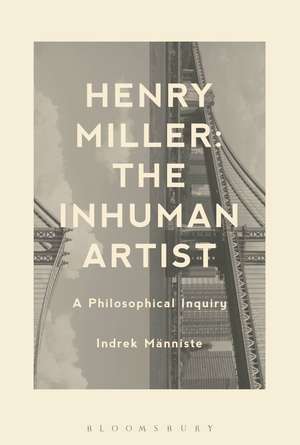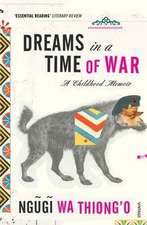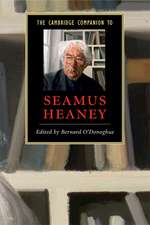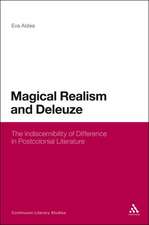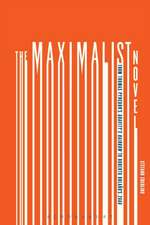Henry Miller: The Inhuman Artist: A Philosophical Inquiry
Autor Dr. Indrek Männisteen Limba Engleză Paperback – 17 dec 2014
| Toate formatele și edițiile | Preț | Express |
|---|---|---|
| Paperback (1) | 254.84 lei 6-8 săpt. | |
| Bloomsbury Publishing – 17 dec 2014 | 254.84 lei 6-8 săpt. | |
| Hardback (1) | 712.49 lei 6-8 săpt. | |
| Bloomsbury Publishing – 14 aug 2013 | 712.49 lei 6-8 săpt. |
Preț: 254.84 lei
Preț vechi: 329.78 lei
-23% Nou
Puncte Express: 382
Preț estimativ în valută:
48.79€ • 50.20$ • 41.12£
48.79€ • 50.20$ • 41.12£
Carte tipărită la comandă
Livrare economică 01-15 martie
Preluare comenzi: 021 569.72.76
Specificații
ISBN-13: 9781628928068
ISBN-10: 1628928069
Pagini: 168
Dimensiuni: 152 x 229 x 9 mm
Greutate: 0.23 kg
Editura: Bloomsbury Publishing
Colecția Bloomsbury Academic
Locul publicării:New York, United States
ISBN-10: 1628928069
Pagini: 168
Dimensiuni: 152 x 229 x 9 mm
Greutate: 0.23 kg
Editura: Bloomsbury Publishing
Colecția Bloomsbury Academic
Locul publicării:New York, United States
Caracteristici
Originality: currently no book exists that deals specifically with Henry Miller's philosophical avenues
Notă biografică
Indrek Männiste is Visiting Fellow in the Department of English and Comparative Literature at the University of Warwick, UK. He also currently works as a Marie Curie Research Fellow at University of Tartu, Estonia. His primary research interest is modernist literature and its philosophical implications.
Cuprins
Introduction1. Prelude to a Future Philosophy: Modernist melancholy, Dadaist dances & Surrealist songs 2. Apocalypse Now: The End of History and the Twofold Present 3. The Anxiety of Enframing: Miller, Modern technology & Work 4. Behold, I Teach You the Inhuman!: Inhuman Artist, ܨbermensch & China 5. From Theoria To Praxis: The Poetry of Life Conclusion
Recenzii
Männiste's book offers a strong foundation for any systematic understanding of the overarching concepts informing the writer's work. Miller claimed to lack a system, but, as Männiste demonstrates, this very lack of a traditional approach is a hallmark of many innovative nineteenth- and twentieth-century philosophies. Männiste's book will dispel many myths and distortions regarding Miller's use of philosophical models as well as the meaning of his own ideas.
The work of Henry Miller is undergoing a reappraisal today as the controversies of the 1970s recede. This reappraisal has been aesthetic and historical, but not yet philosophical, and Männiste's work fills an important gap in the scholarship. It is persuasive and original, and will be an important resource for graduate and higher undergraduate students encountering or studying Miller's work, as it is the first book to propose an underlying intellectual system behind Miller's total output.
Written with diligence and precision, Männiste's exploration of an overriding philosophy in the work of Henry Miller addresses an important aspect of twentieth-century Modernism. More than a reading of Miller's seminal works, this study presents a panorama of the intersections between art, philosophy and aesthetics; an invaluable read for both Miller fans and readers interested in the history of ideas.
Highlighting Miller's interest in various, global metaphysical traditions, particularly of nineteenth- and twentieth-century Europe, Männiste's Henry Miller: The Inhuman Artist offers a timely perspective, reminding us why scholars have been paying closer attention to the philosophical undercurrents in Miller's work.
What are rather complex philosophical differences are explained with great finesse by Manniste, and this in many ways is one of the main strengths of this book. Manniste shows an incredibly thorough grasp of the intricacies of Miller's philosophical thought processes throughout his life. [...] This is a well-written, well-researched book that aims to place Miller as a philosophical writer, deserving of more respect than he currently receives from academia. It makes good use of the work that has been done by other Miller specialists and is absolutely representative of the high standard of analysis that Miller deserves.
The work of Henry Miller is undergoing a reappraisal today as the controversies of the 1970s recede. This reappraisal has been aesthetic and historical, but not yet philosophical, and Männiste's work fills an important gap in the scholarship. It is persuasive and original, and will be an important resource for graduate and higher undergraduate students encountering or studying Miller's work, as it is the first book to propose an underlying intellectual system behind Miller's total output.
Written with diligence and precision, Männiste's exploration of an overriding philosophy in the work of Henry Miller addresses an important aspect of twentieth-century Modernism. More than a reading of Miller's seminal works, this study presents a panorama of the intersections between art, philosophy and aesthetics; an invaluable read for both Miller fans and readers interested in the history of ideas.
Highlighting Miller's interest in various, global metaphysical traditions, particularly of nineteenth- and twentieth-century Europe, Männiste's Henry Miller: The Inhuman Artist offers a timely perspective, reminding us why scholars have been paying closer attention to the philosophical undercurrents in Miller's work.
What are rather complex philosophical differences are explained with great finesse by Manniste, and this in many ways is one of the main strengths of this book. Manniste shows an incredibly thorough grasp of the intricacies of Miller's philosophical thought processes throughout his life. [...] This is a well-written, well-researched book that aims to place Miller as a philosophical writer, deserving of more respect than he currently receives from academia. It makes good use of the work that has been done by other Miller specialists and is absolutely representative of the high standard of analysis that Miller deserves.
